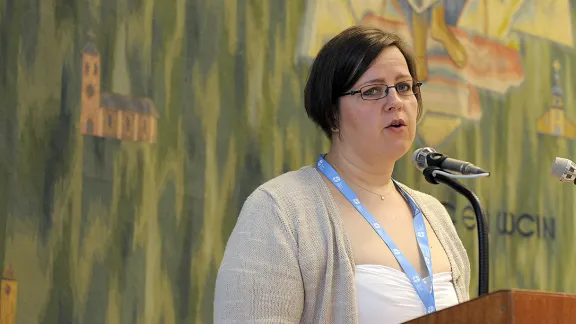
Rev. Dr Minna Hietamäki presents the document, The Self-Understanding of the Lutheran Communion. Photo: LWF/Helen Putsman
LWF Council agrees process for member church study of self-understanding document
GENEVA, 19 June 2015 (LWI) - The Lutheran World Federation (LWF) Council received with appreciation a study document on “The Self-Understanding of the Lutheran Communion,” and agreed on a process to enable member churches study it in preparation for the 2017 Assembly.
The Council asked the Communion Office (CO) to prepare a process with questions and timelines for further reception of the document in the LWF member churches. The CO will send the document to the churches for further study and encourage the churches to discuss it during Pre-Assemblies in anticipation of the 2017 Twelfth Assembly in Windhoek, Namibia.
The LWF governing body also expressed appreciation to the seven-person study group that compiled the document, led by Rev. Dr Minna Hietamäki, Evangelical Lutheran Church of Finland. The 18-month study process included joint reflection and consultation with representatives from the LWF regions.
The 2013 Council meeting requested the LWF General Secretary to establish the study group in order to engage the member churches in discerning how to deal with differences while upholding their commitment to being a communion of churches.
The study document defines communion as a gift and a task that is lived out in both unity and diversity. Explaining further what task entails, it discusses the questions of autonomy and accountability, shared decision making, disagreements in the communion and possible resources that can guide the communion in discerning life together amidst diversity.
Plenary discussions following Hietamäki’s presentation focused on the document’s relevance to the communion and its churches, and on the process of discussing it further in the respective church contexts.
A good theological framework
Hietamäki responded to a question on the absence of a concrete proposal on how to discuss and appropriate the document in a local context. She noted that the group’s mandate did not focus on the process beyond the adoption of the document by Council, but on producing content that would serve as an incentive for discussion. She said she hoped the Council would offer more concrete proposals on how to proceed with the document.
Rev. Dr Robin J. Steinke, Evangelical Lutheran Church in America (ELCA), said she shared the enthusiasm expressed in the report. She said the document offers perspectives on how the LWF engages in robust relations, and also asks the question what this really means for the member churches.
“It is a good theological framework that guides our theological understanding,” commented Rev. Dr Rafael Malpica-Padilla, from the ELCA. Referring to the emphasis of “word and sacraments” as events in the communion, he said it was important in this respect to “think about the day to day life of member churches.” More attention should be paid to issues raised for further discussion in the document including the subject of mutual accountability and the role of the CO, he added.
On the reception process, Presiding Bishop Dr Ndanganeni P. Phaswana, Evangelical Lutheran Church in Southern Africa, proposed that seminaries that are training pastors be also introduced to the document, and that ways be found to have workshops in order to popularize the document. “Let’s start introducing it now, and continue sensitizing our communion about it. A journey of one million steps begins with one step forward,” he said.
Rev. Dr Gloria Rojas Vargas, Evangelical Lutheran Church in Chile, supported the proposal to use the pre-assemblies “to gather the reaction of our churches and bring them to the assembly in 2017.”
Accountability in communion
Prof. Bernd Oberdorfer, Evangelical Lutheran Church in Bavaria (Germany) expressed his appreciation for the study document, saying he saw it as a reminder about the gift of communion. He said the central questions for the churches should be: “How do you [the churches] want to live out your responsibility in the Lutheran communion and how should this accountability be reflected in your decisions and communication?”
Colleen E. Cunningham, Moravian Church in South Africa, emphasized her appreciation for the document “with regard to conflict and conflict resolution. Let us take the document in our regional meetings. It will give us time to reflect and look at it from within our own contexts.”
The self-understanding document develops a theologically grounded approach on how to live out the gift of communion. It also affirms shared convictions based on Lutheran confessional writings and Scripture, and highlights issues that require further conversation.
Council 2015: more information


